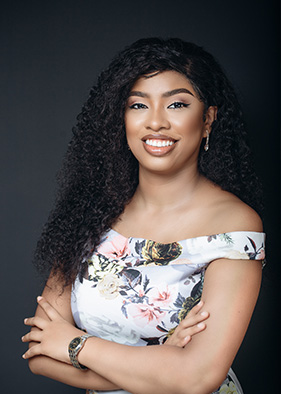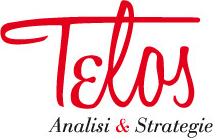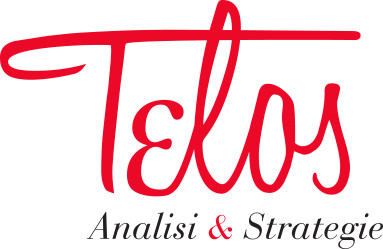August 2025, Year XVII, no. 8
Cassandra Akinde
People First
“I chose this career in global health because I couldn’t ignore the social determinants of health and economic disparities. I wanted to be part of building systems that prioritise people, not just policies.”
Telos: You were described as ‘an emerging global health leader’. What do you do today?
Cassandra Akinde: Thank you so much! I am a public health doctor, research consultant, and a social entrepreneur working at the intersection of health equity and social innovation. Today, I lead multiple initiatives such as: The Neo Child Initiative for Africa, a nonprofit organisation where my team and I deliver essential healthcare services and education to children living in underserved communities across Africa; Obrin Health, a Femtech startup that provides an AI-driven, culturally sensitive digital platform that allows women to track their reproductive health, access expert advice instantly via chatbot, order SRH products discreetly, and connect with supportive communities all while preserving their privacy, dignity, and convenience. I also founded AquaEd Solutions, a social venture bringing clean, safe drinking water and Water Sanitation and Hygiene (WASH) education to families through sustainable, community-driven models. Through these platforms, I combine research, policy advocacy, and social innovation to drive impact at the grassroots level especially for vulnerable populations like women, children and people with disabilities. My work is driven by a simple goal: to advance a model of inclusive community driven healthcare that will shape the future of public health in Africa and beyond.
Why did you choose to pursue this career?
The pivotal moment came about 10 years ago while I was still in medical school, focused on passing my exams and minding my books. During my community health posting, a five-year-old boy named Bayo was brought into our clinic with severe symptoms of tetanus, a vaccine preventable disease. But it was too late. His condition was fatal. That experience devastated me. I couldn’t stop thinking about the barriers Bayo and his family must have faced such as lack of access to health education, vaccine information, lifesaving vaccines and systemic gaps. It was in that moment I made a promise to myself: to devote my life in changing this narrative and improving access to essential healthcare services and literacy for underserved communities across low- and middle-income Countries. That commitment led me down a path of community service, volunteering, non-profit leadership and research. And so far, it has been the most fulfilling and greatest purpose of my life. I chose this career in global health because I couldn’t ignore the social determinants of health and economic disparities. I wanted to be part of building systems that prioritise people, not just policies. My career in global health is my way of turning ideas into action and creating solutions that are specifically tailored to meet the needs of local communities, backed by evidence, and driven by the belief that everyone, regardless of where they are born, deserves the chance to live a healthy life and achieve their full live potential.
Your work has already made a tremendous impact on the society. How?
Thank you so much for the kind words! As an impact-driven leader, my work has always cantered on closing the health equity gap for underserved communities in Nigeria whether through advocacy, innovation, or research. Through my leadership at The Neo Child Initiative for Africa, my team and I have reached over 40,000 children with essential health services from immunisations to deworming and health education. At Obrin Health, we are improving access to sexual and reproductive health services by combining locally made, affordable hygiene products with smart, user-friendly technology. Our mobile app and AI-powered chatbot empowers women and girls, especially in underserved communities, to take control of their health. And through AquaEd Solutions, we are cutting down on waterborne diseases. My commitment goes beyond direct service. I have led infectious disease surveillance and implementation research on COVID-19, Lassa, Mpox, and Dengue work that feeds into national policy and helps build resilient systems. My master’s degree from the London School of Hygiene & Tropical Medicine opened doors to international collaborations, research grants, and publications in global journals like The Lancet and Frontiers in Public Health. I am also deeply passionate about mentorship and capacity building. As an LSHTM Alumni Ambassador and a Chevening Scholar, I have helped over 60 aspiring health leaders access global opportunities, hone their grant-writing skills, and find their voice in public health. I particularly focus on elevating women in global health encouraging them to lead with empathy, integrity, and bold ideas. Ultimately, my impact is measured by empowerment. If communities are taking charge of their health, if young professionals are leading transformative change, then I know my work is making a difference.
What future for Africa?
I would say that Africa’s story is changing for the better and it is no longer a narrative of just its challenges, but of breakthroughs and innovation. In the last 20 years, we have seen real gains: longer life expectancy, rising income levels, and growing access to education. Today, a child born on this continent has a better chance than ever to live a healthier life, receive an education, and contribute to a thriving economy. That is not just a narrative, it is backed by data. As a public health professional, I have seen how access to healthcare uplifts entire communities. As a social entrepreneur, I know that Africa’s answers lie within locally driven, scalable, and sustainable solutions. What we need now is strong, resilient systems, health systems that don’t collapse under preventable communicable and non-communicable diseases, education systems that cultivate critical thinkers and economies that prioritize innovation over extraction.
And we have the greatest resource of all: our youth. Over 60% of Africa’s population is under 35. That is not just a demographic; it’s a movement. Our young people are building startups, launching research, leading change. They’re not waiting, they’re leading. The media often asks where Africa’s future lies. I will tell you: it’s already here. It’s in labs, classrooms, marketplaces, and boardrooms across the continent. What we need now is strategic, respectful, long-term investment in education, health equity, and inclusive economies. Global partnerships have a role to play, but they must be rooted in mutual respect and shared goals not charity. Africa doesn’t need fixing. It needs platforms. And my work is dedicated to clearing the way so this generation and the next can rise and thrive.
Marco Sonsini
Editorial
“Over 60% of Africa’s population is under 35. That is not just a demographic; it’s a movement.” These words of our August guest for PRIMOPIANOSCALAc, Cassandra Akinde, physician, researcher, and social entrepreneur, resonate deeply.
Africa’s future is not a distant hope, it’s already unfolding. Beyond the often-narrow media portrayals of crisis and fragility, a new narrative is emerging: one of growth, resilience, and innovation. Life expectancy is rising, educational access is expanding, and local solutions are flourishing. Africa’s greatest asset is its youth. And they are not waiting for permission; they are already leading. Cassandra rejects the outdated model of charity. What Africa needs, she argues, is platforms, not pity. Strategic investments. Long-term partnerships rooted in mutual respect. Robust, inclusive systems that can withstand both disease and inequality. Her vision champions agency, creativity, and shared responsibility - a future built from within. Cassandra’s story is not just one of personal excellence. It is part of a broader movement - led by a new generation that is reimagining what it means to care, to build, and to lead.
In a world where public health is too often caught between bureaucracy, inequality, and profit-driven agendas, some choose a different path-one that puts people first. Cassandra Akinde, is one of those rare individuals who not only identify problems but build concrete, community-centred solutions. Grounded in data, empathy, and bold innovation, her work is reshaping how we think about healthcare delivery in Africa and beyond.
Her mission is rooted in global health, a field that transcends borders and seeks to improve health equity for all people, everywhere. Global health is not just about fighting epidemics or delivering vaccines. It’s a multidisciplinary approach that addresses the structural causes of health disparities - from poverty to education, from climate change to governance - and promotes sustainable, inclusive systems that put equity at the core. In this sense, global health is not just a profession. It is an act of social justice.
In this conversation, Cassandra shares her journey - from medical school classrooms in Nigeria to launching impactful health initiatives that have reached tens of thousands of women and children across the African continent. Her voice is clear and unwavering: health equity is not a privilege. It is a right. And to secure it, we must design systems that truly listen to, serve, and empower the communities most often left behind. With over eight years of international experience across Africa and Europe, Cassandra brings a strategic blend of clinical expertise, research acumen, community engagement, social innovation and program leadership. Her commitment to building a healthier future is not just fuelled by impact data, but by a profound belief in collaboration, she is dedicated to shaping a healthier future and creating a meaningful, global impact in people’s lives, with a focus on underserved communities worldwide. This is more than the story of one woman’s impact. It is a blueprint for a new kind of leadership- empathetic, visionary, and unapologetically people-first.
Red, black and white, these are the traditional colors of Telos A&S that you will find in the 2025 cover graphics of PRIMOPIANOSCALAc. We reveal our guest’s identity by showing half of their face on one side and a quote from the interview on the other. Their name is written in Abril Fatface, a classy font inspired by 19th-century European advertising posters.
Mariella Palazzolo

Cassandra Akinde is an award-winning global health and research consultant committed to advancing health equity and strengthening systems for underserved communities worldwide. As a nonprofit leader, she has led multiple high-impact interventions positively reaching over 40,000 children across Nigeria. Her work has earned her numerous accolades, including the Chevening Award Scholarship, the Future Awards Africa Prize for Health and Wellness 2022, the UK Alumni Award for Social Action 2024, RSTMH/NIHR Early Career Research Grant 2024 and most recently TMF Group and Bridge for Billions Beyond the Borders CSR Demo Day and Pitch Competition Winner for Social Entrepreneurs 2025. Cassandra holds a Bachelor’s degree in Medicine and Surgery from the University of Lagos, a Master’s in Tropical Medicine and International Health from the London School of Hygiene and Tropical Medicine, and most recently obtained an MBA at the Quantic School of Business and Technology in the USA.
Akinde is an avid traveller and language enthusiast fluent in English, Spanish, and Russian, with growing proficiency in French and German. Her multilingual abilities are a result of her mixed-race background: Cassandra was born to a Colombian mother and a Nigerian father. She is passionate about storytelling, whether through writing technical reports or educational video scripts, and often finds inspiration during hikes with her friends or while watching Netflix with her family.
If she hadn't pursued this career, Cassandra would have become an investigative journalist, because “I'm very curious by nature and I like to get to the bottom of things.”
Marco Sonsini







SocialTelos